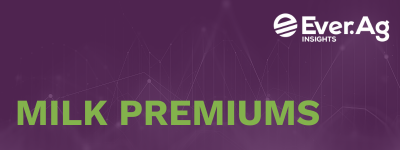
Cattle Markets Shake Off Bearish News
- Nearby live cattle futures closed at $184.68 per hundredweight, up 1.8% on the week, while feeders finished at $248.70, up 3.1%.
- USDA’s latest Cold Storage report had March 31 frozen beef inventories at 432 million pounds, down 15 million from February and -10% year-over-year. The month-to-month decline was just a bit heavier than the five-year average of -13 million pounds. The tight stocks situation likely reflects both lighter animal counts as well as decent demand.
- Weekly beef export sales added up to 15,200 metric tons for 2024, down 14% from the previous week and -3% from the prior four-week average. Shipments: 13,800 metric tons, down from 16,700 from a week ago and below 16,000 metric tons from a year ago. Despite overall lower volume, increases were primarily from Korea, China, and Japan.




Commentary by Colton Vondra
Cattle markets use supply-driven news to shake off bearish leaning headlines.
Monday’s feeder cattle trade proved to be electric, visiting both sides of unchanged, after last week’s seemingly bullish Cattle on Feed report.
HPAI headlines drove the volatility. But, in the end, the market largely shrugged off the stories. Instead, traders leaned on a market-friendly Cattle on Feed report, which showed fewer cattle than expected in feedlots, fewer placements, and fewer fed cattle marketings than last year.


Tight Supplies Support Prices
CME cash feeders printed $243.11 per hundredweight, up $1.11 on Monday afternoon. They continued to move slightly higher, closing the week at $245.15, up 1.3% on the week.
Demand for lighter calves has not waivered across most sale barns in the country, with 500-pound steers still ringing the bell at $3 per pound. Supply tells us prices for all classes of feeder cattle should remain high through fall. US cow herd numbers remain the lowest since the early 1960s.
Midweek fed cattle cash trading in the South ranged between $183-$186 per hundredweight on a live basis, up $1-$3 from the previous week. After a strong Monday for live cattle futures (like feeders), a two-sided trade was the name of the game.

US Beef Ban, HPAI
The HPAI story continues to create noise on the edges of the cattle market. This week, USDA announced it will require testing of dairy cows crossing state lines. In addition, agencies reported that they are finding remnants of the HPAI virus in fluid milk. While neither story has a direct impact on cattle, the headlines have the potential to stir anxiety in cattle markets.
Closer to the beef markets, however, Colombia announced restrictions on imports of beef from animals slaughtered in states reporting HPAI cases in dairy cattle: Idaho, Kansas, Michigan, New Mexico, North Carolina, Ohio, South Dakota, and Texas.
Colombia is a small customer for the US beef industry, importing just $39 million worth last year, a fraction of the $10 billion in overall US beef exports. But the headline wasn’t constructive and offered a reminder that the story continues to have potential consequences.

Drought Conditions Improve
Weekly US Drought Monitor data showed major grazing areas in good condition. As grazing season approaches, cattle producers prepare to move yearling grazers and cow-calf pairs into pastures. A solid start to the season marks a stark change to major dry pockets in the last few years. Summer moisture will help slow beef cow liquidation, and adequate rainfall may probe producers to keep back some heifer calves this fall.
For assistance in what’s best for your operation, please reach out to our team to discuss strategies in depth. Give us a call!
Futures and options on futures trading involve significant risk and are not suitable for every investor. Information contained herein is strictly the opinion of its author and not necessarily of Ever.Ag and is intended for informational purposes. Information is obtained from sources believed reliable but is in no way guaranteed. Opinions, market data and recommendations are subject to change at any time. Past results are not indicative of future results. Trey Freeman, Matt Wolf and Cole Adams maintain financial interests in the commodity contracts mentioned within this research report at the time it is published. Antonio Corona, Brad Lyle, Stephen Hardison, Michael Todd Rowen, Dan Johnson, and Colton Vondra do not maintain financial interest in the commodity contracts mentioned within this research report at the time it is published. This report is in the nature of a solicitation. Reproduction or redistribution is prohibited by law. Ever.Ag Insurance Services is an affiliate of Ever.Ag and is a licensed insurance agency in the following states: AZ, CA, CO, CT, FL, GA, ID, IL, IN, IA, KS, KY, LA, ME, MD, MA, MI, MN, MO, MT, NE, NV, NH, NM, NY, NC, ND, OK, OH, OR, PA, RI, SD, TN, TX, UT, VT, VA, WA, WV, WI, WY. This agency is an equal-opportunity employer.













